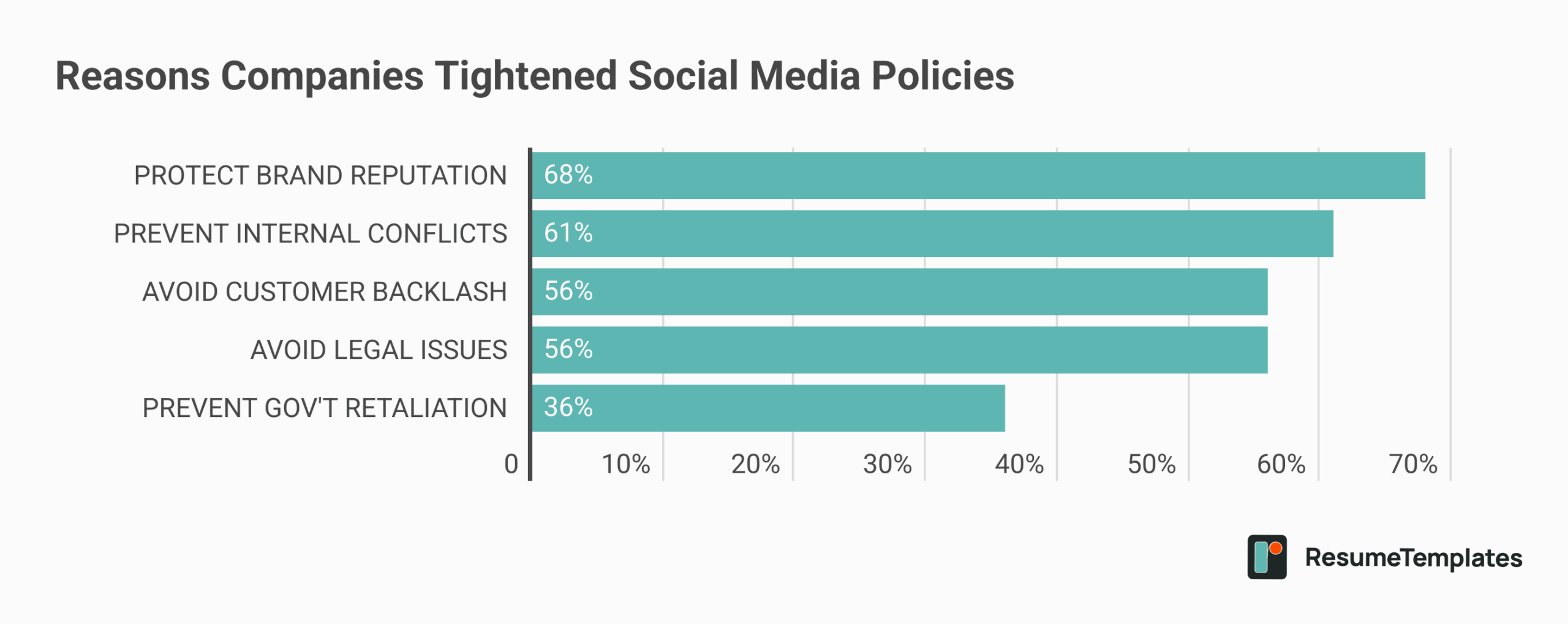ResumeTemplates.com surveyed 1,249 business leaders to understand how companies are responding to employee political speech on social media. The findings show that many companies are tightening policies, disciplining employees, and anticipating increasing risks tied to political posts.
Highlights:
- 1 in 3 companies have strengthened their social media policies this year
- 1 in 4 companies disciplined employees for political social media posts this month, many of which were about Charlie Kirk
- Business leaders worry about social media posts causing internal conflict, customer backlash, and government retaliation
- Nearly half of companies expect employee political speech to become more of a liability in 2026
1 in 4 Companies See Spike in Workplace Conflicts After Kirk Assassination
In the past six months, 29% of companies say there has been an uptick in conflicts tied to employee political social media posts. Among these companies, 72% say the problem worsened after the Charlie Kirk assassination, with 17% reporting a significant increase in conflicts tied to employee social media posts and 55% reporting some increase.
In the past month, 25% of companies disciplined an employee for political social media posts, and of those cases, 60% involved content about Charlie Kirk. The most common actions taken were suspension (39%), reprimand (30%), and termination (26%).

“Disciplining employees for political speech outside of work can make some feel their beliefs aren’t welcome. Still, companies have broad discretion to regulate employee speech to protect their brand and avoid association with extreme or offensive views. With most states being at-will, employers can fire workers for nearly any reason aside from discrimination or retaliation,” says ResumeTemplate.com’s Chief Career Strategist Julia Toothacre.
“Political discussions can create tension or even a hostile environment at work, so employees are better off avoiding them. Most companies don’t want to be linked to extreme views, and anything that risks damaging their reputation will likely be addressed.”
1 in 3 Companies Tightened Their Social Media Policies This Year
Over the past six months, companies have taken varied approaches to regulating employee social media use. Nearly one-third (32%) expanded their policies to make them more restrictive, while two-thirds (66%) left them unchanged. About 2% of companies reported loosening rules during this time.
Among those that toughened restrictions, timing varied. Three in 10 implemented changes this month, half did so two to three months ago, and about one in five made adjustments four to six months ago.
When asked who is most affected by social media policies, companies most often say they apply equally to all employees (44%). However, many impose stricter guidelines on certain groups. At 39% of companies, managers face the most restrictions, followed by customer-facing employees (28%) and senior leadership (21%).
Business leaders are divided on the risks posed by employee social media activity. Nearly half (47%) believe posts about divisive political topics represent either a major liability (22%) or a moderate liability (25%) for their company.
Companies crack down over concerns about brand reputation, internal conflicts, and government retaliation
When asked why they expanded restrictions, business leaders point to multiple risks tied to employee social media activity. Protecting brand reputation is the leading factor, cited by more than two-thirds of companies (68%). Preventing internal conflict also plays a major role (61%), along with avoiding customer backlash (56%).
Legal concerns are another driver, with 56% of companies tightening policies to reduce liability exposure. Additionally, more than one in three (36%) fear government retaliation.

“Stricter social media rules, which some may view as invasive or controlling, can backfire on recruiting and retention. The more restrictive the policy, the less attractive the company becomes to top talent, similar to what we’ve seen with unpopular return-to-office mandates,” says Toothacre. “Another risk is workplace mistrust. When employees feel watched or fear being reported by co-workers, it erodes culture and makes collaboration harder.”
Nearly Half of Companies See Employee Political Speech as Growing Liability
Companies anticipate that the challenges around political expression online will continue. Looking ahead to 2026, 49% of companies expect employee political speech on social media to become a bigger liability.
When asked about the most significant risks, two-thirds of companies (66%) cite internal conflict among employees. Other top concerns include brand reputation (60%), customer backlash (59%), legal issues (45%), and government retaliation (29%). Only 4% say there are no risks associated with political speech.
Views on whether limits should be imposed are mixed. About one in four companies (24%) say political speech should definitely be limited on social media, while 40% say it probably should. On the other side, 22% say it probably should not, and 14% say it definitely should not.
Methodology: This survey was commissioned by ResumeTemplates.com and conducted online by Pollfish in September 2025. It gathered responses from 1,249 business leaders at U.S. companies. Demographic criteria such as age, education, income, and job title were used to qualify participants.
The margin of error is approximately ±3 percentage points at the 95% confidence level. Any inquiries can be directed to [email protected].
Resume Templates offers HR approved resume templates to help you create a professional resume in minutes. Choose from several template options and even pre-populate a resume from your profile.
